UP KALIPUNAN





Various sectors from across the University of the Philippines (UP) System and beyond have urged the university administration to put more value on public service as part of faculty members’ academic work.
This entails, among others: increasing the percentage of public service in UP System programs; institutionalizing service-learning and community engagement; incentivizing faculty to perform public service functions; and increasing the percentage of public service in Faculty Merit Promotion.
This was expressed in the 2024 U.P. Public Service Summit held on May 3031, 2024 in Vidal Tan Hall, University of the Philippines Diliman, Quezon City, as well as in the subsequent activities, forums and consultations with various stakeholders.
On August 30, 2024, the 5th Colleges and Universities Public Service Conference was held at Palawan State University in Puerto Princesa City. Among the activities was a roundtable discussion on public service governance in higher education institutions.
Among the proposals put forward in the Public Service Summit in May was the establishment of a Public Service Productivity Award, as well as a System-based public service grant and mobilization fund, and institutionalization of public service load credit.
The summit’s plenary speakers urged UP faculty members and participants of the summit to merge public service with the faculty’s other academic functions like research and teaching, thus enhancing and giving inspiration to the latter.
Dr. Judy Taguiwalo, former Department of Social Welfare and
Overworked, underpaid and under threat, but deeply dedicated to provide the best possible education to the youth.
This, in so many words, was how teachers and educators of basic education units of the University of the Philippines (UP) system described their situation during Suma’t Suri: UP Basic Education Summit on February 29 at Alcantara Hall in the Student Union Building in UP Diliman, Quezon City. The summit is organized by the All U.P. Academic Employees Union (AUPAEU)-National, AUPAEU - Los Baños, and the Office of the Faculty Regent, in partnership with UP
by Ramon Guillermo
Nobyembre 2, 2024 nang lumabas ang pahayag na may pamagat na “UP Diliman University Council Stands with Palestine, Denounces Genocide by Israel.” Halos isang buwan na noon ang walang pakundangang pagpapaulan ng bomba ng Israel sa Gaza. Maipagmamalaki ng UP na isa ito sa mga unang unibersidad na naglabas ng ganitong pahayag samantalang todo ang hayagang pagsuporta sa kampanyang militar ng Israel ng karamihan ng mga unibersidad sa Europa, UK, at USA.
Natural lamang na magkakaroon pa rin ng mga debate bago mailabas ang pahayag. May mga tanong hinggil sa kaangkupan ng paggamit ng terminong “genocide” para ilarawan ang mga aksiyon ng Israel. Naisalang din sa usapin ang tunay na masalimuot na mga depinisyon ng salitang genocide mismo. May iilan ding nagsabi na hindi dapat pumuposisyon ang mga akademiko sa ganitong mga usaping pulitikal lalo na at napaka-kontrobersiyal sa global na antas. Mayroon ding minoryang paniniwala na dapat walang pinapanigan ang mga akademiko bilang mga akademiko. Mayroon ding nanggigiit ng nosyon ng “pagkabalanse” na hindi nagkokondena o sumusuporta sa alinmang panig, bagkus ay sapat na manawagan na lamang para sa pagtatapos ng karahasan at panananig ng kapayapaan. Sa katunaya’y lumitaw sa talakayan na walang natatanging espesyalista ang UP Diliman hinggil sa usaping Palestina-Israel. Gayumpama’y nanaig pa rin sa UC ang katwirang
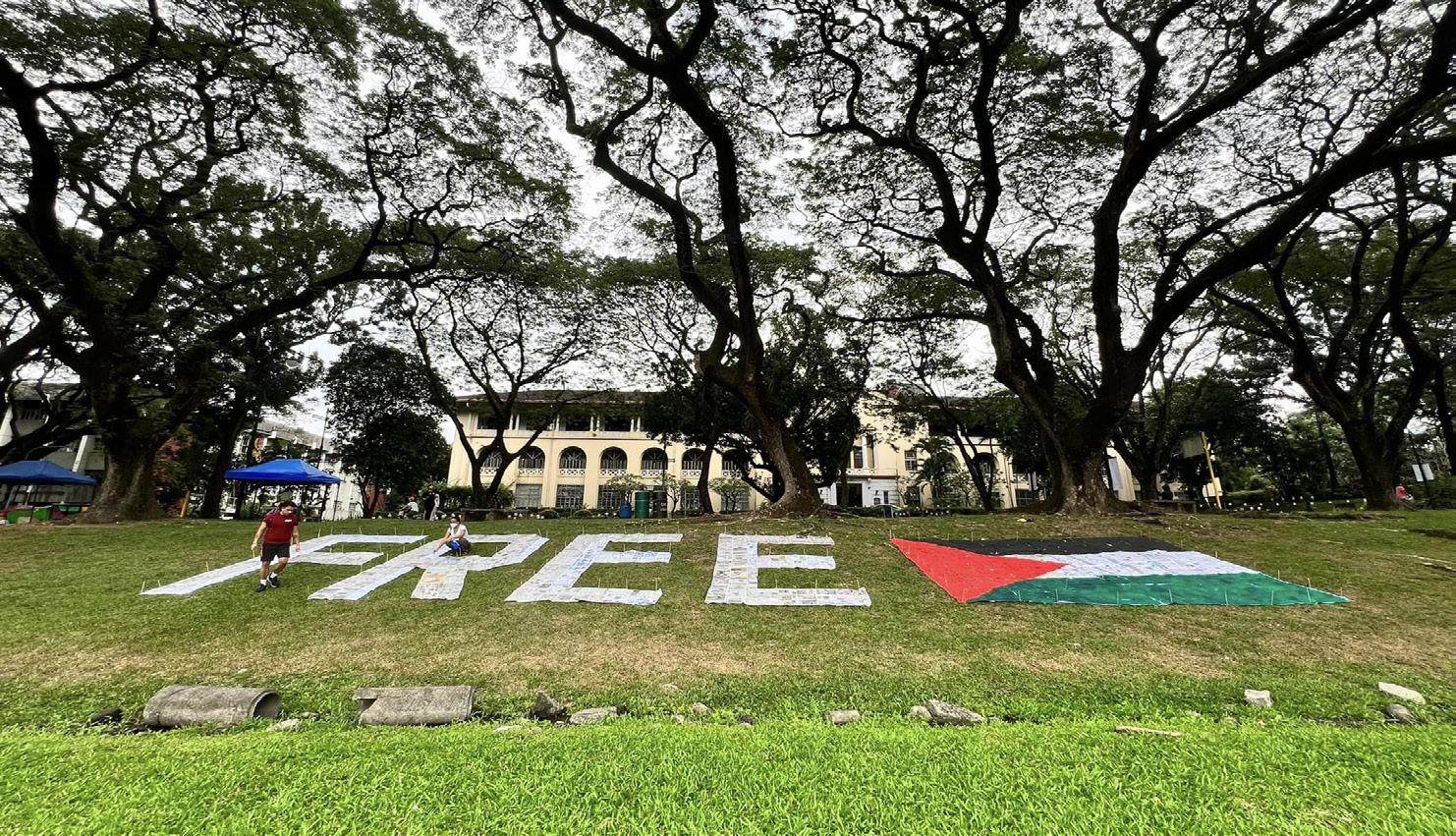
hindi naman nangangailangan ng labis na masalimuot na pagsusuri sa kasong ito. Kaharap ng libo-libo na, kahit noon pa lamang, na pinagpapatay ng mga sundalong Israeli na inosenteng maliliit na bata at sanggol, ang kinakailangan lamang talaga ay ang damdaming makatao.
Hanggang ngayon ay todo-suporta pa rin sa Israel ang karamihan sa mga nangungunang unibersidad ng daigdig sa henosidyo na isinasagawa ng Israel sa sa Palestina. Binubusalan at marahas nilang pinapatahimik ang lahat ng mga kritikal at maka-Palestinang tinig mula sa hanay ng mga guro at mag-aaral. Sanhi nito’y nahubaran na ang ilusyon ng matibay at matatag na kalayaang akademiko sa Kanluraning mga pamantasan. Gamit ang libo-libong dambuhalang bomba na patuloy na sinusuplay ng USA, binomba at pinatag na ng Israel ang halos lahat ng paaralan, kolehiyo at unibersidad sa Gaza. Walumpung porsiyento ng mga paaralan ay nawasak na at wala nang natirang nakatindig sa dating labindalawang unibersidad ng Gaza. Naging abo na ang mga aklatan, museo, at mga monumentong pangkultura ng mga Palestino. Libo-libo nang guro,
propesor, mag-aaral, administrador, at kawani sa edukasyon ang sadyang pinagpapatay ng sandatahang Israeli, nang walang pakundangan, sa iba’t ibang paraan. Sila’y inaaresto, pinahihirapan, ginagahasa, binabaril, binobomba, sinusunog, ginugutom, at hinahayaang mamatay sa sakit.
“Scholasticide” ang terminong ginagamit ngayon ng mga eksperto ng United Nations para tukuyin ang sistematiko at planadong pagwasak sa buong imprastrukturang pangedukasyon ng Palestina na kasalukuyang isinasagawa ng Israel. Nalalapit nang umabot ng isang taon ang bangungot na ito ng sangkatauhan. Hindi kaya napapanahon na muling magsagawa ang komunidad ng UP ng bagong mga pagkilos para mag-ambag ng tinig sa patuloy na lumalakas na panawagan para sa makatarungang kapayapaan at tunay na kalayaan para sa Palestina? K
Dr. Ramon Guillermo is the Director of the Center for International Studies in UP Diliman. He also served as President of the All UP Academic Employees Union, and was Faculty Regent from 2019 to 2020.
By Gerardo Lanuza*
by Gerardo Lanuza
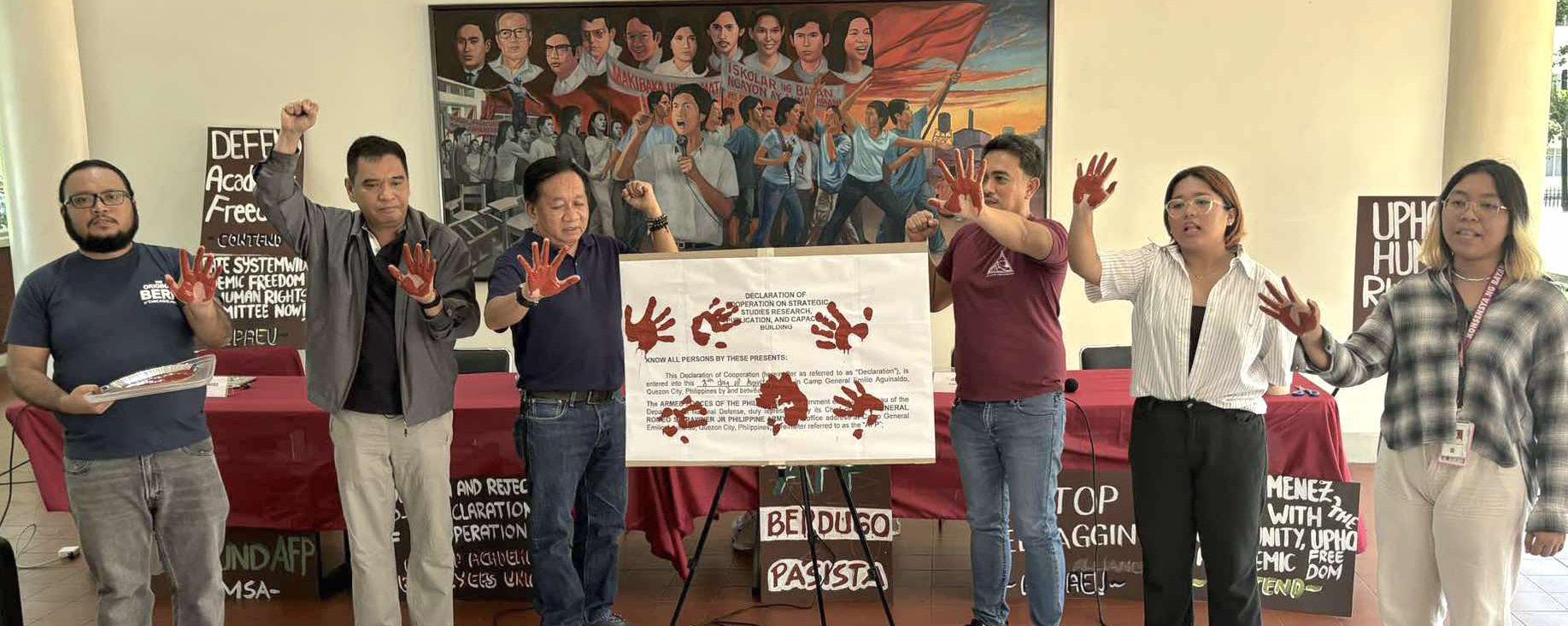
A“As university men and women you have accepted the solemn duty to pursue the truth wherever it may lead. Of course this mission involves certain risks, but whoever thought that truth, which is the noblest prize that life can bestow, can be had absolutely free for the asking, without pain or sacrifice of any kind?” - S. P. Lopez, 12th President of UP, 1973
long with my colleagues in the Congress of Teachers/Educators for Nationalism and Democracy (CONTEND), I condemn the signing of the Declaration of Cooperation at Camp Aguinaldo in Quezon City last August 8 by the representatives of the University of the Philippines (UP) and the Armed Forces of the Philippines (AFP). The signed agreement sets the “initial framework for future projects involving collaborative research, publications, and capacity-building initiatives” between the Armed Forces of the Philippines under its Chief of Staff Romeo S. Brawner, Jr. of the Philippine Army, and the current President of the University of the Philippines, Atty. Angelo A. Jimenez (PAJ).
We deplore the sinister move of President Jimenez amid the current swarm of redtagging against UP as a community— faculty, organizations, students, and union members and officers— initiated by Senator Bato de la Rosa and the National Task Force to End Local Communist Armed Conflict (NTF-ELCAC). By unilaterally inking a cooperation agreement with the AFP, President Jimenez showed heedless disregard for the safety and welfare of his constituents. Behaving like a corporate CEO, he disregarded the collegial and democratic culture of our university by turning a blind eye to democratic consultation and displaying insensitivity towards the political sentiments of the academic community he swore to protect.
The University and its community have been indefatigably defending its academic freedom and autonomy against the state’s intrusion and police interference in the life of the University, from the legendary Diliman Commune of 1971 to the declaration of martial law in 1972, from EDSA 1 People Power to Duterte’s unbridled reign of terror. This collective
resistance that took various forms, from armed resistance to non-violent mass movement, from parliamentary struggle to scholarly works, exacted a heavy toll on the University. Many of our students and faculty perished from brutal state repression whence the radical tradition of the University was established. Hence, wooing the AFP for academic cooperation is tantamount to ignominious betrayal of this radical tradition of the University. Our University breeds revolutionaries, not terrorists.
As faculty and education workers, we denounce the honey-coated concessions given by the University to AFP through the Center for Integrative Development Studies (CIDS). Cordially inviting the personnel from AFP to monitor UP projects, evaluate our outputs, edit our papers, suggest possible research, and organize fora on the campus are insidious means of militarizing the University. The Cooperation Agreement positioned CIDS as the bastion of fascism and the wellspring of militarization of the University.
Alas, President Jimenez shamefacedly
revealed he has no intention of restoring the UP-DND Accord unilaterally abrogated by former Defense Sec. Delfin Lorenzana in 2021. The Accord would have protected UP from incursions of mercenaries of AFP. Instead, he made a Mephistophelian bargain to sell the soul of the University in exchange for largesse from AFP. Is the University this desperate for research and drooling for funding that like Judas we are willing to hand over our students and faculty to the mercenaries of AFP?
Our faculty, students, and scholars can always do research on the military establishment. That is their choice. But they can do so based on their individual
Trist’n Buenaflor
Ang tanging bomba na mahahanap dito Yoong pangtanggal ng bara sa paliguan. Minsan kasi di nagfl-flush ang mga tao Hihintayin pang sa CSC1 mapagalitan.
Wala rin talagang baril sa amin, Lalagyan ng mga placard muna ang uunahin.
Iligal na droga ba ang hanap?
Sa Pulisya kayo humarap.
Masaya dito kahit na palaging may mobil, Aming pagsasama, hindi nila mapipigil.
Kolektibong pamumuhay, Sa h.q, kami ay sinasanay.
Lumuha ang isa, lahat ay luluha Tumawa ang isa, salo-salo sa saya.
Sa aming h.q, maraming black shirt at labada
Ang wala lang dito ay armas at bomba.
1On Criticism and Self-Criticism isang sistema ng assess sa gawi at kilos ng mga miyembro sa loob ng isang samahan.
By Early Sol Gadong
When UP President Angelo
“Jijil” Jimenez posted about the university’s “new” mantra, updating Honor and Excellence to include Service, several of my former students at UP High School in Iloilo shared their pagkaham-ot on social media. They said they always believed Service was already part of the university’s code. After all, they were taught to “put honor first before excellence and always in service of the community.” Still, this renewed focus on service is a good step towards reinvigorating UP’s role as not just a center of knowledge but also a champion of public service. As the national university, our teaching, research, and community work should not be treated as individual endeavors but rather as interconnected pursuits, all aimed at one goal: serving the people.
Trist’n Buenaflor
May sasalubong sayo sa dulo ng bulto mga libo-libong taong pinili ang walang-hanggang pananatili.
Tulad ng pagsalo ng bundok sa bawat ulan na pumapatak.
What does this mean for us as academic personnel of this institution?
Quality and accessible education is the foundation of any nation’s development. Therefore, as faculty, we must see teaching as more than just the transmission of knowledge and skills. Rather, we must embrace our role in shaping the minds that shape the nation. This means every discussion, every demonstration, every piece of advice we give to our students is an act of service to the people. But this can only succeed if we learn from the people too, seeing that the communities we serve are just as fertile a learning ground as our classrooms since engaging with the masses enriches both teacher and student and, in the end, our society.
Meanwhile, if we consider research as the pursuit of truth, our endeavors must then go beyond mere intellectual curiosity and be grounded in the needs of the people. Our work should tackle the urgent issues of our time, be informed by the hopes and struggles of the communities and aim to bring real change to society. Community engagement is where UP’s duty to public service is most clearly shown, ensuring that what we learn within our halls reaches those who need it. Only by listening to the people, learning from them, and standing with them, can we truly meet their needs.
Naghihintay ang micropono, naghihintay ang bandila sa inyong mga kamay na mapagpalaya.
Tulad ng magsasakang nakikibaka ang iyong pagbabalik ay sisiguraduhin ng lupa
Tulad ng manggagawang arawan sa pabrika ang paghanap sa inyo’y aming kolektibong paggawa.
Sisiguraduhing hindi magiging blanko ang karton
Itataas ang placard, militansya ay iaahon.
Mga anak ng bayan, di man magpakita ng ilang taon, Paniguradong sa inyo’y may palaging sasalubong.
In all this, we must therefore be one in defending academic freedom, which is the lifeblood of meaningful education, research, and community engagement. Once, in a meeting between the Academic Union and President Jimenez, when we were relaying various cases of attacks to academic freedom experienced by students, staff, and faculty from different constituent units, he clarified, “Are

these really attacks on academic freedom or freedom of expression?”
To this I responded, “When our freedom of expression is threatened, how can it not affect the way we handle our classes? How can we feel secure in our classrooms discussing ideas that may be seen as subversive and even rebellious?”
It is academic freedom that gives us the power to question the system and challenge old ideas so we can offer new, bold solutions to our problems. Unfortunately, recent events such as the rise in terror-tagging of activists and community workers, along

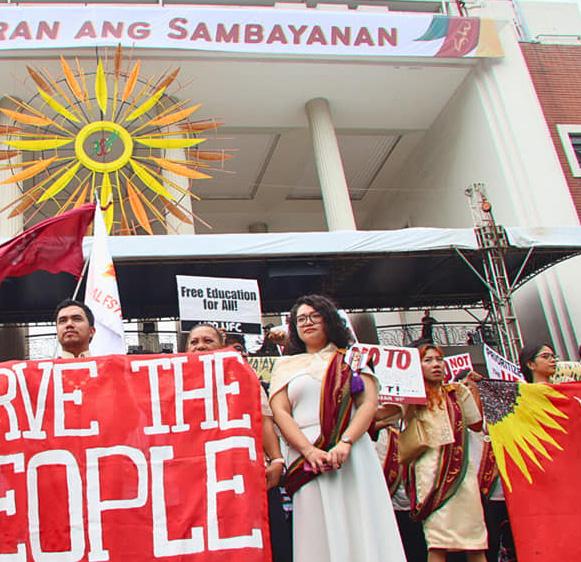
Public Service | p. 1
Development secretary and former Faculty Regent, for instance, pointed out UP’s support for Lumad struggle for justice and protection of their ancestral land as an example of the university’s commitment to social change.
“Iyung pagbibigay ng UP ng espasyo, halimbawa, sa mga Lumad, di lang usapin ng welfare. Ang scholarship natin maaaring tumungo sa advocacy. And advocacy can lead to scholarship. It can also become subject of our scholarship. Iyun ang gusto natin: To encourage engagement with the communities not just because it is public service but it can also lead to teaching, research and scholarship,” she said.
Dr. Erlinda Palaganas, president of the Cordillera Center for Health and Social Concerns, former president of the Philippine Nurses Association, as well as former director of the Institute of Management in UP Baguio, urged the faculty participants to fuse their research work with advocacy for the marginalized communities.
“Do research that has something to do with the masses, with the people. At yung passion mo for service will also reflect in your teaching,” Dr. Palanagas added.
Dr. Edelina Dela Paz, president of Health Action for Human Rights and former division head of Urban Community Based Health Program of the Department of Family and Community Medicine of UP Manila, shared that in her experience, medical students highly appreciate it when they engage in community work.

with the university’s signing of the Declaration of Cooperation with the Armed Forces of the Philippines, threaten this freedom. Makakulurdam, because they create a climate where critical voices are silenced, and new ideas are suppressed. Some of our university personnel are already risking life and limb to extend their services to our sisters and brothers from the socioeconomic and geographical margins. Being wrongfully branded as terrorists not only puts their lives at further unnecessary risk but also weakens the university’s ability to connect with communities openly and without fear. Terrortagging is therefore not just an attack on individuals; it is an attack on the very mission of our university.
Truly, the heart of our work, whether in teaching, research, or community engagement, must always be service. Thus, we must collectively stand firm against anything that threatens our freedom to think, to speak, and to serve, because the university’s strength lies in its commitment to serve the people.
Service must always be our driving force in the pursuit of excellence. It should be the ultimate reason behind the honor we strive to uphold. K
Early Sol A. Gadong is the recipient of the OneUP Faculty Grant for Teaching and Research (2019-2021) and the OneUP Faculty Grant for Creative Work and Public Service (2022-2024). She was also recently conferred the award of UP Artist 2. Sol is a faculty member of the Division of Professional Education –UP High School in Iloilo and currently serves as Director-at-Large of the All U.P. Academic Employees Union National Executive Board.
For her part, Dr. Cherish Aileen Brillon, director of UP Padayon Public Service Office, said that UP placing greater emphasis on public service is in line with the UP Charter of 2008.
“The UP Charter of 2008 mandates that UP as a national university be a public service university by providing various forms of community, public and volunteer service, as well as scholarly and technical assistance to the government, the private sector, and civil society,” she said.
Faculty Regent Carl Marc Ramota also urged the faculty participants to take part in social movements beyond the university as part of their public service to the country.
“Public service must always be anchored on social justice, democracy, and genuine social change. This points to the emancipatory goal of public service that seeks not just to serve but to transform, to change society. As a national university, UP exists to serve the Filipino people, especially the marginalized and oppressed,” he said.
Serving the people means taking part in a broader struggle for social justice, democracy, and meaningful change, Ramota concluded.
The system-wide summit was organized by the Opisina ng Faculty Regent, UP Padayon Public Service Office, and the All U.P. Academic Employees Union (AUPAEU) including its Manila Chapter, with the support of the Offices of the President, Vice President for Academic Affairs, and the Vice President for Public Affairs. K
UP Salary Fight Network
BBM: Barat, Barya at Makunat!
Iyan ang hatol ng mga empleyadong nalulubog sa utang at nasasadlak sa nagtataasang bayarin bagamat may “dagdagsuweldong” inilabas sa porma ng Executive Order (EO) 64 si Pang. Ferdinand “Bongbong” Marcos, Jr.
Maiiwang nakanganga ang mga empleyadong ipinagkasya ng EO 64 sa PhP 50 dagdag sahod kada araw. Papaano’y mananatiling malayo ito sa Living Wage batay sa pag-aaral ng IBON Foundation Inc. at kakatwa pang sususugan ng National Economic Development Authority (NEDA) na sasapat ang PhP 64 kada araw na badyet sa pagkain ng bawat Pilipino.
Sa bisperas ng national budget deliberations para sa susunod na taon, bubulalas sa Unibersidad ng Pilipinas (UP) ang napipintong PhP 2.4B budget cut. Bagamat nakatuon ang kaltas sa Capital Outlay at Maintenance and Other Operating Expenses, mananatiling mababa ang nakalaan sa Personnel Services na pagkukuhanan sana ng mas mataas na sahod at benepisyo ng mga kawani sa Unibersidad ng Pilipinas.
Ibig sabihin, mababa ang badyet na nakalaan para sa sahod at benepisyo ng mga kawani, REPS at guro kung ikukumpara sa badyet ng Unibersidad sa proyektong imprastraktura nito. Konsentrado sa imprastraktura ang badyet ng UP—bagay na nakaayon sa tunguhin ni Pangulong Angelo Jimenez
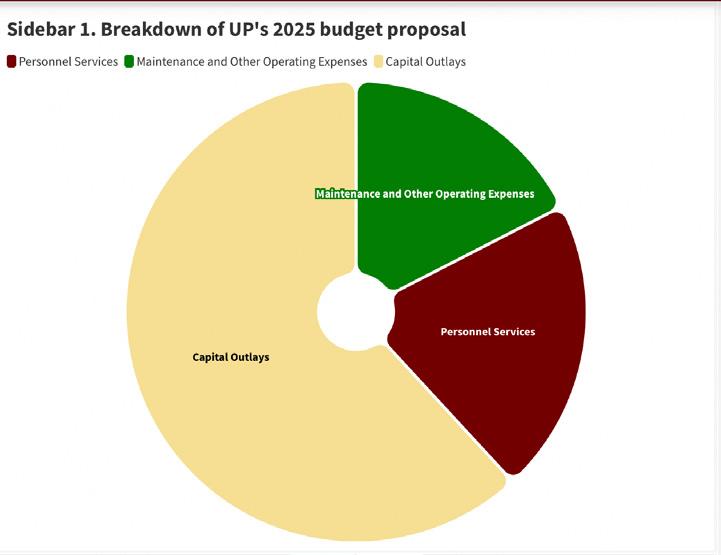

(PAJ) na kaliwa’t kanang pagbubukas ng mga kampus at programa samantalang kuwestiyonable ang pagtataguyod at sustainability nito habang mananatiling naiiwan ang nakabinbing mga proyektong imprastraktura sa mga constituent unit ng Unibersidad ng Pilipinas.
Tila wala namang katiyakan na makapagbigay ng karagdagang plantilla item para nasa 3,914 (CSC-IGHR Hunyo 2024) job order at contract of service personnel (JO/COS) para sana makapaghanda ng Unibersidad sa tuluyang implementasyon ng pagbabawal ng JO/ COS hanggang Disyembre 2025. Kung gayon, ang mumunting dagdag badyet sa Personnel Services ng Unibersidad ay para lamang maibigay ang barat na pagtaas ng sahod mula sa EO 64.
Malaking pangamba pa rin ang tuluyang paglayo ng Unibersidad sa prinsipyo nitong paglilingkod sa sambayanan, lalo’t tatamaan ng budget cut ang pondo para sa mga programang panserbisyo at ekstensiyon. Hindi rin nakakatulong ang pagpaling ng mga kampus tungong komersiyaslisasyon para makabawi at mapunan ang ibayong pangangailangan sa karagdagang badyet; halimbawa nito ang nakaambang pagbubukas ng kontrobersiyal na Dilimall sa UP Diliman, pati na rin ang pangkabuuang plano ng Unibersidad sa ipinasa nitong LUDIP na naglalaman ng planong pribatisasyon at komersiyalisasyon ng mga kampus.
May magagawa pa ba?
Sa lakas ng sama-samang pagkilos, napigilan ang tatlong bilyong (PhP 3B) budget cut ng Unibersidad ng Pilipinas
nitong 2024, at tumaas pa nang PhP 21B ang pangkabuuang badyet ng State Universities and Colleges. Matamis na napagwagian ito dulot ng masigasig na talakayan, petisyon at kampanya sa loob at labas ng klasrum, malakihang mobilisasyon mula Quezon Hall hanggang sa tarangkahan ng Senado at aktibong pakikilahok ng akademiko at mga karatig-komunidad at SUCs.
Nasa ating kamay na muli ang hamon na mapigilan ang kaltas-badyet, ang lakas para makipagkapit-bisig muli sa iba pang kolehiyo’t unibersidad, at ang pagpupursigi para palawakin ang suporta tungo sa dekalidad at libreng edukasyon, mas mataas na sahod at benepisyo, regularisasyon ng mga mangaggawang pang-edukasyon, pati na rin ang pagtaas sa pangkabuuang badyet sa batayang serbisyo at benepisyo ng mga mamamayan at hindi sa pondong panggiyera, pondong laan sa kautangan, at pondo para sa kurapsiyon. K
Ang UP Salary Fight Network (UPSFN) ay malawak na ugnayan ng faculty, REPS at kawani, regular man o kontraktuwal, na nagsusulong ng makabuluhan at makatarungang pagtaas ng suweldo at pagsasaayos ng mga problematikong iskema at praktika sa pagpapasahod sa Unibersidad ng Pilipinas.
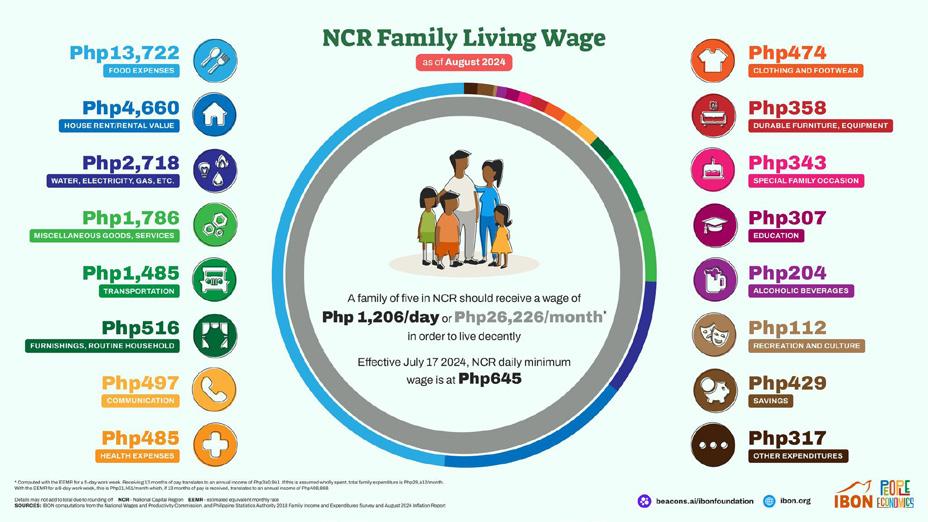
Integrated School (Diliman), UP Rural High School (Los Baños), UP High School Cebu, and U.P. High School in Iloilo.
Also participating were representatives of units with early child care and education: UP Department of Family Life and Child Development of the College of Home Economics in UP Diliman and Balay Balay Child Minding Center of the Gender and Development Program in UP Visayas.
Faculty Regent Carl Marc Ramota, who gave the opening remarks, said this summit is the first of its kind in UP.
“It is high time we put on the agenda the academic concerns, economic security, and health and wellbeing of teachers in the basic education units. UP must recognize that faculty welfare is its institutional responsibility,” said Ramota.
Among the issues raised by the participants are the lack of staffing in the basic education units; lack of support and services for teachers, including just compensation for the additional work they take on; low salaries and lack of opportunities for promotions; substandard school facilities; and attacks on academic freedom and the the right to organize of teachers.
In his video message to the summit, UP Diliman Chancellor Edgardo Carlo L. Vistan II said he is eager to hear the resolutions to be passed in the summit. These, he said, will help administrators like him address the many problems facing basic education units.
Dr. Frances Olivia M. Magtoto, college secretary of the UP College of Education in UP Diliman, also gave a message of support on behalf of Dean Jerome T. Buenviaje.
Principals of basic education units in the system also gave messages: Principal Joseph Ocampo of UP Integrated School in UP Diliman; Principal Catherine Rodel of UP High School Cebu; Principal Edelia Braga in UP High School in Iloilo; and Principal Mabel Buela of UP Rural High School in Los Baños.
In the afternoon, the participants were divided into three break-out groups to draw up resolutions that address the need to create a nurturing environment for teaching and learning. K

capacity. But to commit and mobilize the entire University—its spaces, personnel, scholars, and resources—to serve the ends of the military establishment is a clearcut surrender of our academic freedom without any struggle to the bosom of AFP and its mercenary tradition.
President Jimenez even touts that his pet project “won’t curtail academic freedom because UP researchers can choose and define their specific terms of engagement.” Such naïve reasoning fails to acknowledge that by assenting to cooperate with the mercenaries of the AFP the University inescapably becomes beholden to the funding, monitoring, evaluation, and scrutiny of the AFP. Signing the Cooperation Agreement is already a capitulation to the securitization of the University. Thus, we must strongly assert that academic freedom is best served by severing these ties, and instead, independently pursuing studies and research not tied to the national security goals of the AFP. How can our University, whose only weapon is the criticism of weapons, embrace the repressive state apparatus that uses its lethal weapons to suppress the criticism of weapons, yet remains sovereign and free?
To argue, like PAJ did, that “Gen. Romeo Brawner and Secretary of National Defense Gilberto EGC Teodoro are both from UP” is a non sequitur argument. Being a UP graduate is not a guarantee one will not turn out as a Judas or plundering dictator! Look at Marcos, Sr.! Luckily our University also produced great revolutionary mass leaders like the Tiamzons and Joma Sison. And UP did not ink a cooperation agreement with the Communist Party of the Philippines!
“Our policy is engagement. The national defense establishment as an institution is not an enemy,” so claims President Jimenez. Another non sequitur argument. Just because we want to protect UP space from the mercenaries of AFP does not mean we consider them enemies. On the contrary, it is the AFP mercenaries that consider UP as an enemy, so it has aggressively maneuvered its forces to enter the gates of the University. This time they succeeded with PAJ and CIDS. And whoever said that we refuse engagement with AFP? Our students have written theses and dissertations on the AFP. Our faculty have served as consultants and lead researchers with the agencies of AFP. However, these engagements did not commit the entire UP community to the security concerns of the AFP. We must emphatically insist that academic freedom is needed precisely for such engagement. Without academic freedom and autonomy, our engagement becomes unashamed complicity with the mercenary tradition of AFP.
Lastly, we must not forget that the AFP and its mercenary tradition was established in the image of the US military. It is completely dependent on US foreign military financing. The AFP, along with the Philippine National Police (PNP), are tools in the hands of the US imperialists for suppressing the patriotic and democratic forces in the country. They indiscriminately bomb civilian populations, abduct activists, create trumped up charges against dissenters, forcibly close Lumad schools, and camp out in schools in the name of weeding out terrorists. Forging an institutional cooperation with the AFP is, therefore, the same as approving these barbarous acts—even with the best intentions of educating the mercenaries of the AFP to make them more humane and preach their faith in the rule of law. To hope that through the Cooperation Agreement UP can humanize the AFP is sheer wishful thinking.
Therefore, we urge our fellow faculty and education workers to stand firmly against the signed Cooperation Agreement. United, let us demand that PAJ abrogate the agreement. Our University must continue to remain as a sacrosanct space where unbridled critical minds can pursue critical discourses no matter how inimical and threatening to the established beliefs and social order. And if PAJ stubbornly refuses our collective demand, then, unquestionably, we know whose interests he serves. K
*Dr. Gerardo Lanuza is with the Sociology Department of the College of Social Sciences and Philosophy at UP Diliman.
“When
we push for welfare, we should start at the bottom. When we rise, we rise with them.”
Thus explained Asst. Prof. Early Sol Gadong of the UP Salary Fight Network and director-at-large of the All UP Academic Employees Union, during the Kapakanan sa Pamantasan: A Forum on Faculty and Staff Welfare at the University of the Philippines (UP) Miag-ao campus on February 27, 2024.
The said forum was one such event in the Kapakanan Forum Series conducted in various constitutent universities this year.
The forum series were held at UP Mindanao on March 18, 2024; UP Cebu on March 22, 2024; UP Manila School of Health Sciences in Palo, Leyte on Sept. 5, 2024; and UP Tacloban College on Sept. 6, 2024.
Speakers for the UP Mindanao were Faculty Regent Hon. Carl Marc Ramota, Dr. Jackie Lou Tagubase of the UP Mindanao University Council Committee on Faculty

Development, Conduct, and Welfare, Prof. Gadong, and Dr. Rommel Rodriguez, who is the National Vice President for Faculty of the All U.P. Academic Employees Union.
In UP Cebu, the speakers were FR Ramota, UP Visayas’ Prof. Gadong, and Dr. Rodriguez.
In UP Tacloban, the speakers were FR Ramota, Dr. Ervina Espina of the Division of Social Sciences and Coordinator of Ugnayan ng Pahinungod in UP Tacloban, Prof. Gadong, and AUPAEU’s Ma. Stephanie Andaya, Ram Hernandez, and Dr. Rodriguez.
Advocating for FWCs
The Kapakanan: Faculty
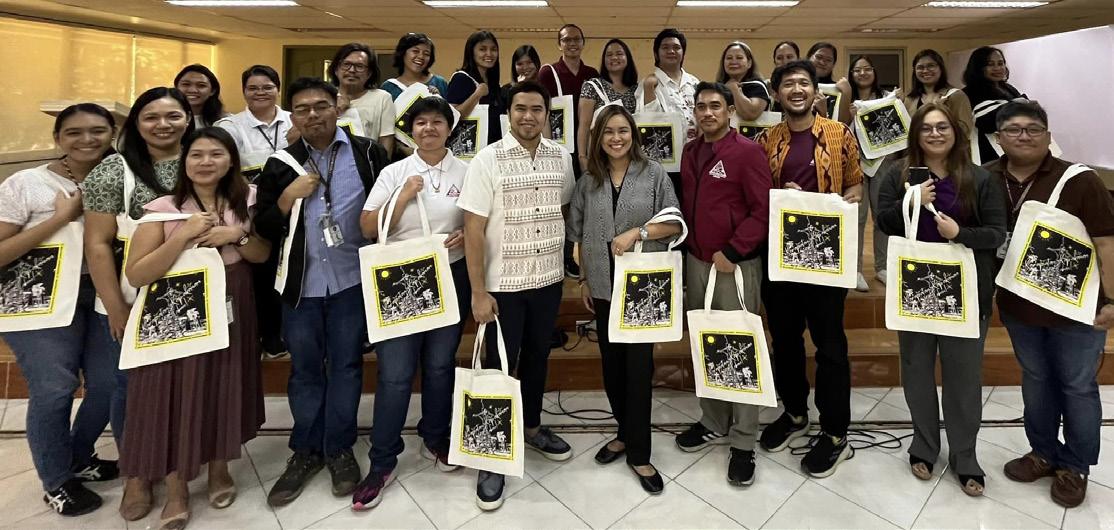


Welfare Forum Series became occasion for the Office of the Faculty Regent to advocate for the establishment of Faculty Welfare Councils both at the constituent university and UP System levels.
The said council aims to cover three broad areas of faculty welfare: academic concerns, economic security, and physical and mental health and wellbeing.
“It’s about time that we put the welfare of our faculty and staff on the agenda of the University,” FR Ramota said.
He added that establishing the Faculty Welfare Council will be the first step towards this direction of prioritizing
welfare.
It was inspired by the institutionalization of REPS Welfare Council (RWC) in the UP System and in CUs in 2018, and prepared by a technical working group formed by the Office of the Faculty Regent.
The technical working group was led by Dr. Johnrev Guilaran of UP Visayas, with Dr. Wilfredo Alangui of UP Baguio, Dr. Ruth Gamboa of UP Mindanao, Prof. Pedro Magadan of UP Manila, and Prof. Gadong of UP Visayas as members.
“UP must recognize its institutional responsibility to create a safe and nurturing environment for learning and work,” Ramota said. K
